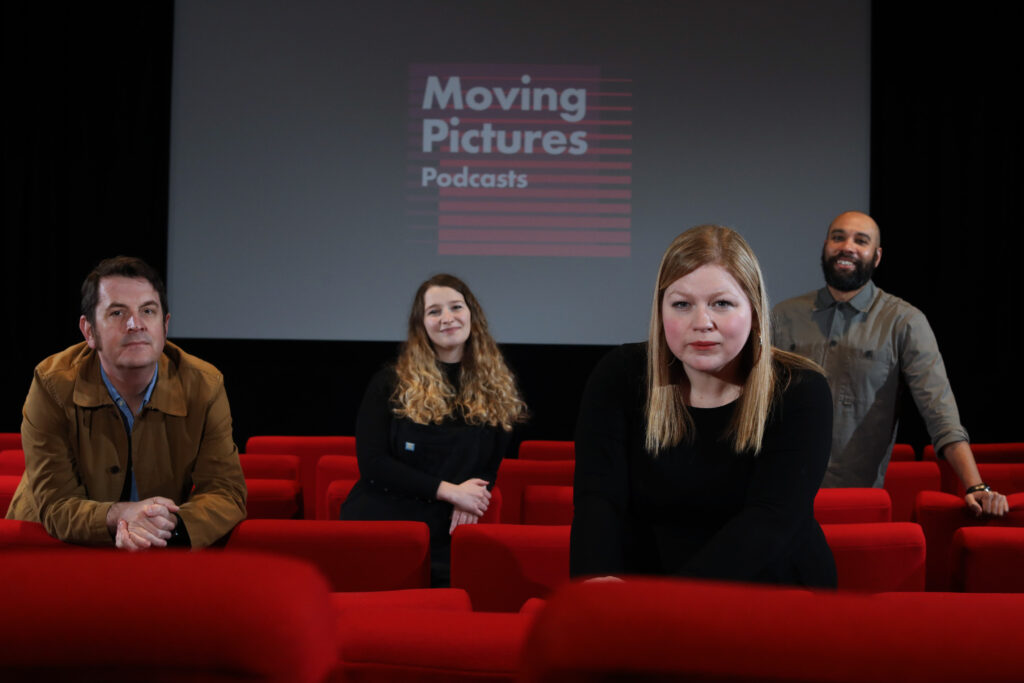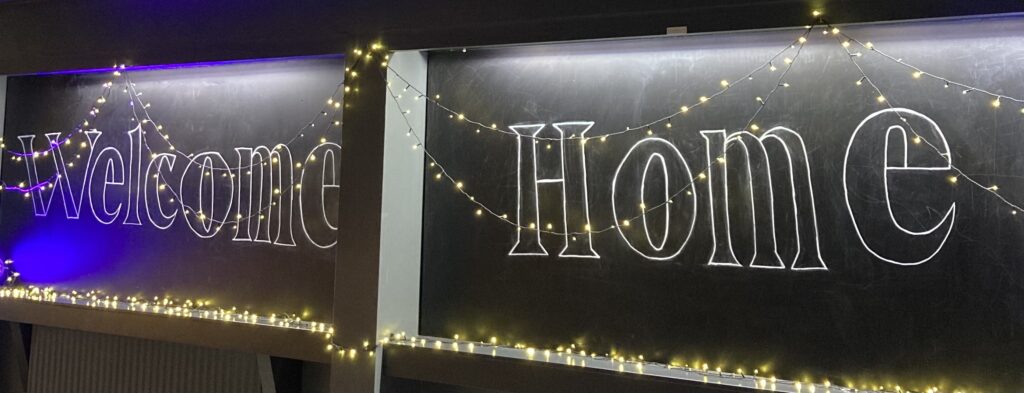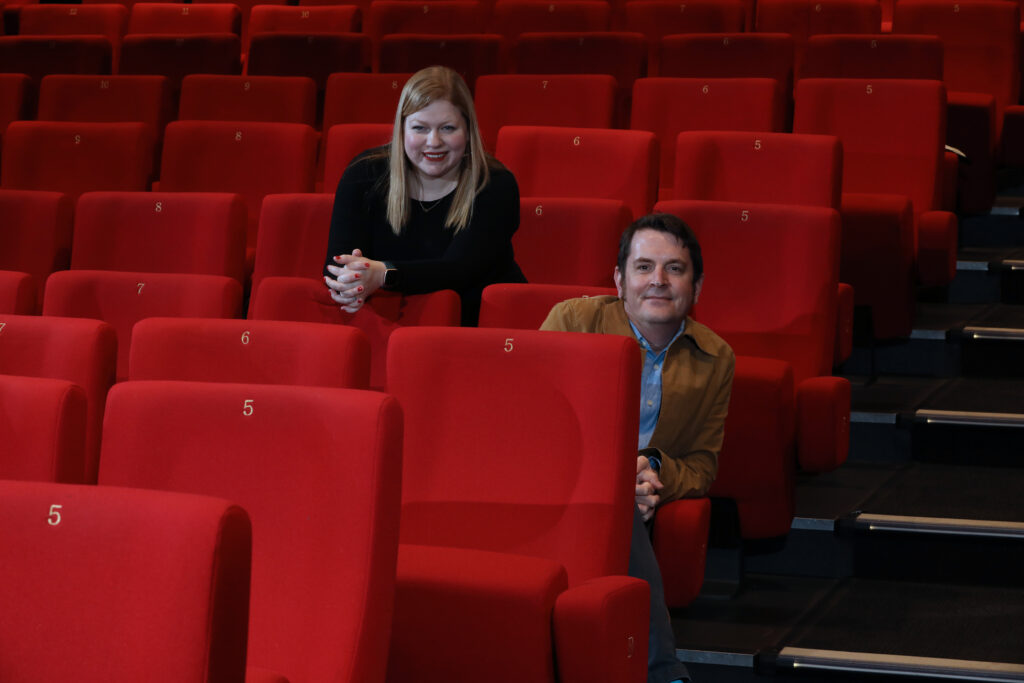Cinemas reopened on 24 May after a year of restrictions that kept most of them closed. For the fourth and final article in our The North Stays in the Picture series, Jenny McCullough talked to Eavan King from Nerve Centre in Derry and Sara Gunn-Smith from Film Hub NI in Belfast about cinemas working together to survive and thrive.
Derry’s Nerve Centre: Film’s a “strong cultural feature”
Derry’s Nerve Centre is home to the Foyle Film Festival, which, for over 33 years, has made Derry a hub for cinema in Northern Ireland. Eavan King, who coordinates the Nerve Centre film education programmes for young people, told me that the festival, which started in 1988, and the centre, which was established in 1990, have common roots in the desire of a group of young creatives “to screen films that you couldn’t get in the cinema at the time”. That said, she pointed out that film was always a “strong cultural feature of Derry”:
“There is a huge love of cinema and fond memories of the established cinema venues in Derry as well — it was there before Nerve Centre.”
Eavan loves the “emotional, visceral” medium of cinema and the escapist element that she finds in “big brash noisy Marvel films” as well as in independent filmmaking, Palm Springs and Minari being lockdown favourites.
Locking down, and moving online
I asked Eavan to think back to March 2020. The Nerve Centre programmes were in full swing and the Foyle Film Festival team had the Intercultural & Anti-Racism Festival ready to screen. Eavan was on location in Ebrington working with Christopher Eccleston on Endless, a short film that Raw Nerve had produced. Within a few days, the first full-scale lockdown was in place. Eavan said:
“It’s surreal to think of it now. Really tough on the Festival team, Director and Programmer Bernie McLaughlin and Festival Assistant Christopher Morrison. They were days away from opening, with hundreds of bookings and it was all shut down overnight.”
The two dedicated cinema spaces and the music venue closed. The “hothouse of activity” at the centre that includes young filmmakers and other creative learning projects moved online. When doors closed and everyone was out of the building, Eavan told me:
“It was shocking but also typical of the … alchemy in Nerve Centre that’s very creative, very self-driven, very can-do, so people have a tendency just to get on with it.”

2020 became a year of partnerships
Getting to grips with Zoom and other platforms very quickly enabled Eavan and her colleagues to maintain Nerve Centre’s education provision. Film exhibition was a different story for the Festival team. “You’re literally about to deliver a festival when all of a sudden the events, the venue and the audience are taken away. It’s just not possible to deliver them.” But the exhibition sector learned new skills too – by working together. 2020 became a year of partnerships, between Belfast and Derry, and between different parts of the sector. As Eavan said:
“It was great to see all the festivals and all the venues support each other to share ideas and knowledge and let people know how it went. It happened! The Foyle Film Festival went ahead in November with a really fantastic programme of 35-odd films and the Belfast Film Festival went ahead.”
It was a testament to the creativity and determination of Bernie and the team that the Foyle Film Festival went ahead with a programme of 35 films, Eavan told me. When films could not be shown in physical venues, Eavan said, the film exhibition and wider creative sectors stepped up a gear:
“We all worked very hard to maintain the connection with audiences in whatever way we could. The exhibition sector has shown great sustainability and great survivability to still be able to offer. And now you can see quite interesting things happening in terms of online exhibition and how venues are really beginning to get to grips with that and to start to become very creative with it too.”
Balancing offline and online experiences
QFT’s player has provided cinemas across Northern Ireland with a glimpse of the potential for online exhibition to complement live cinema. From the Nerve Centre’s perspective, the “big question” in the exhibition sector is about engaging new audiences online and still providing “beautiful independent cinematic experiences in the venues within which they’re meant to be seen.” With that in mind, she anticipated “a lot of people coming back to live cinema in their droves” initially, and, alongside that “surge back to cinema”, the continued development of online elements that could engage a wider, more diverse audience and expand the network of cinemas that help and support each other. Going online, Eavan said, had:
“Gotten rid of city borders, it’s gotten rid of regions, regional cinemas and all that. The emphasis will have to be on the product that you’re creating for your local audience: how do you make that distinguishable online? How do you make an enjoyable live event? Do you do a bit of both?”

Photo taken at Queen’s Film Theatre, Belfast (QFT)
Widening accessibility, and adapting to change
Accessibility is a vital part of cinema’s future, online and live. Eavan said that the Nerve Centre creative programmes and Foyle Film Festival already did a “huge amount of outreach and engagement with disadvantaged groups and communities”. The online offer could be made more accessible, but, for people with dementia and their carers, people from under-represented communities or those in rural areas:
“That common viewing experience and being in a room with other people who are lost in the moment should be available anywhere and everywhere that is possible.”
Eavan counted Nerve Centre, with its range of creative media programmes and platforms for engagement and its “capacity to adapt and adapt quickly”, as one of the lucky venues. She felt for the parts of the sector that had been harder hit: the standalone cinemas and the community cinemas. “It has been really difficult,” she said, “but they will return”. The whole sector, she said, had to be realistic about how the whole cinema industry had changed:
“You’ve got studios that are their own distributors … distributors that now have their own online platforms and online channels to showcase their content.”
Competition with streaming platforms: “We’re in this together”
In competition with streaming, the “heightened experience” of cinema will be challenged to make the difference, Eavan said, if exhibitors were creative about programming and providing the best possible experience:
“Those things are going to be talked about … and planned for a good time to come, but the fact is that the conversation is happening, and I think that’s one of the healthiest things to come out of this pandemic.”
As a provider of creative arts, Northern Ireland enjoys the advantage of its small size, which, Eavan said, makes it easier to meet and collaborate regularly. The pandemic has taken that to a new level, “where we all kind of see that we’re in this together and we succeed or fail together, by how much we collaborate and create together.”
For that vital process, cinema in Northern Ireland, whether open or closed, arthouse or multiplex, membership subscription or ticketed by screening, has an action hero in the form of Film Hub NI. As the unsung side of the industry here – while production is famously supported, and proudly promoted – film exhibition is essential for Northern Ireland to reap the benefits. As Sara Gunn-Smith, Film Hub NI’s Marketing and Audiences Officer, “it’s great to bring in the money and make all the films here but if we’ve no screens to show them on then …”. Like everyone who talked to me for this series, Sara points to the role of cinemas as “community spaces”:
“Half the craic is more getting out with people and meeting new people from your community and in terms of mental health and social wellbeing and inclusivity and social cohesion … film is a great leveller.”

Cinema as a place of safety
This isn’t a new phenomenon, as Sara knew well, having produced a film about the Ormeau Road Curzon. She was approached to make the film by people and businesses who wanted to mark their memories and their connection to the place. Sara said simply that “cinema for a lot of people we found was a place of safety … Northern Ireland has had a hard time, a really hard time, and cinemas have been a kind of neutral space.”
Despite the challenges of the changing film market, Sara said, audience numbers had been growing and from the perspective of QFT for example, cinema was “on target for a bumper year”, after screening Parasite and linking up with NT Live for the broadcast and encore of Fleabag, “before all this happened”. Film Hub NI has supported cinemas not only with grants and administration advice and training, but also with encouragement when needed – “fanning the flames” as Matthew put it – and by helping to build camaraderie among Northern Ireland’s screens of all sizes. Since coronavirus took hold, the Hub has been on hand with emergency funding and fortnightly Zoom meet-ups for members looking for guidance, especially when official notice was in short supply (or non-existent).
This continuity of support is set against a transformation in the nature of Sara’s work: “My job is marketing and audiences officer so my job essentially is to tell people ‘Get out of the house! Go to the cinema and have this amazing experience’.” When the order to stay in the house came, first there was a focus on online events and services like QFT Player and then, for the time when cinemas could open again, in partnership with Northern Ireland Screen there was a marketing campaign so sensitive to the circumstances and feelings of nervous audiences that it was “difficult to get the messaging right”. Back to Cinema NI, or #BacktoCinemaNI, provided information about openings and safety measures, with a collection of blog posts reporting first-hand on return visits to local screens and powerful reconnections with the cinema experience.
Sara felt this effect herself when she took her daughter to see Jurassic Park: “one of my favourite films and I hadn’t seen it on the big screen since 1993 … we had a ball, a brilliant time”. Taking into account commercial sensitivity about precise audience figures in the opening periods, by Sara’s reckoning – given that QFT and other cinemas have run at something like a quarter of normal capacity – cinemas that were able to open “did ok, with the capacities they had.” In some cases rates and VAT reductions, and other coronavirus-related support for businesses helped keep cinemas afloat, but Cineworld’s October 2020 announcement that it had closed screens in the UK and Ireland, and “heartbreaking” stories of “cinemas that have already closed and said they can’t reopen ever because they’re financially gone”, do point to what Sara called “a kind of shattered sector”.
As NI cinema diversifies, so it comes together
Talking about reductions in marketing budgets, Teri Kelly from Movie House said “people aren’t always aware of smaller titles”. She added that she doesn’t know what the answers are but that she “would love to see cinemas working together with other cinemas on ideas”.
There are already plans for a further partnership, on independent film, between Movie House and Film Hub NI, and Ann McDermott from Fermanagh Film Club told me about curating family and classic film programmes, without compromising the club’s dedication to bringing films like Ida to a local audience. Matthew Grainger from Newcastle Community Cinema insisted that “there are reasons why people should keep coming to the cinema, whether it’s film societies and community cinemas like us” or whether it’s a “normal” big screen. “We’re all part of a family in that respect,” he said, “it’s just about keeping it going.”
As cinema here diversifies, so it comes together, and if there are any answers about the future of cinema-going to be had at this point in the pandemic (and the streaming primacy), maybe they are to be found in this sense of Northern Ireland’s eclectic screen marketeers as avengers assembling: uniting around the desire to survive, and – when it’s safe – to thrive again, in the service of their, and our, enduring love affair with cinema.
